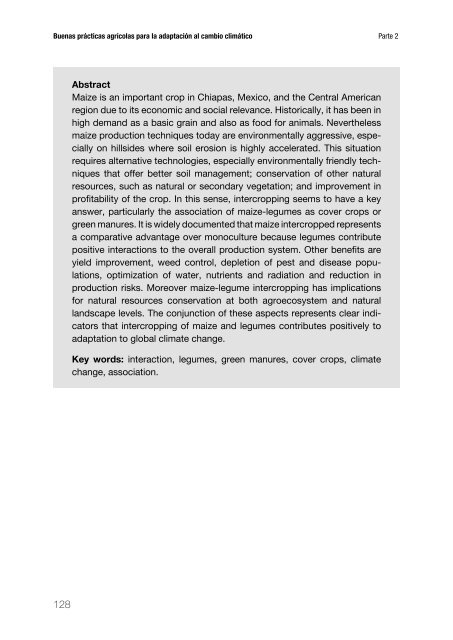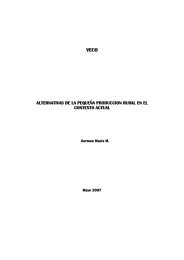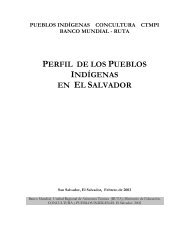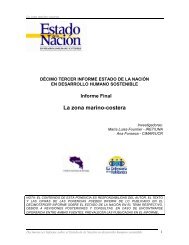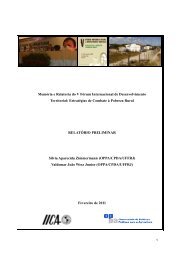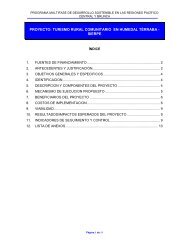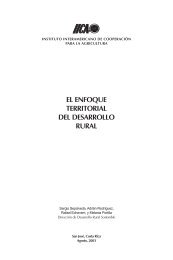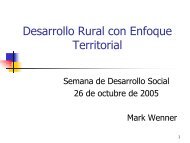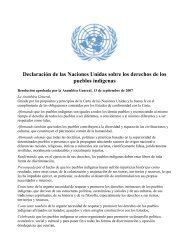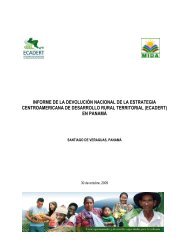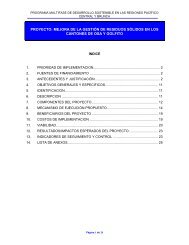- Page 3 and 4:
Serie técnicaInforme técnico No.
- Page 5 and 6:
ContenidoLista de figuras . . . . .
- Page 7:
ContenidoFiguras1.1. Tendencias de
- Page 10 and 11:
Buenas prácticas agrícolas para l
- Page 12 and 13:
Buenas prácticas agrícolas para l
- Page 15 and 16:
AcrónimosAcrónimosADIRI Asociacio
- Page 17:
AcrónimosPMPMPNUMAPNUMA-CAR/UCRPOS
- Page 20 and 21:
Buenas prácticas agrícolas para l
- Page 23 and 24:
PrefacioPrefacioA finales del 2006,
- Page 25:
PrefacioPara finalizar, y con relac
- Page 29 and 30:
Capítulo 1La experiencia de la ada
- Page 31 and 32:
Capítulo 1La experiencia de la ada
- Page 33 and 34:
Capítulo 1La experiencia de la ada
- Page 35 and 36:
Capítulo 1La experiencia de la ada
- Page 37 and 38:
Capítulo 1La experiencia de la ada
- Page 39 and 40:
Capítulo 1La experiencia de la ada
- Page 41 and 42:
Capítulo 1La experiencia de la ada
- Page 43 and 44:
Capítulo 1La experiencia de la ada
- Page 45 and 46:
Capítulo 1La experiencia de la ada
- Page 47:
Capítulo 1La experiencia de la ada
- Page 50 and 51:
Buenas prácticas agrícolas para l
- Page 52 and 53:
Buenas prácticas agrícolas para l
- Page 54 and 55:
Buenas prácticas agrícolas para l
- Page 56 and 57:
Buenas prácticas agrícolas para l
- Page 58 and 59:
Buenas prácticas agrícolas para l
- Page 60 and 61:
Buenas prácticas agrícolas para l
- Page 62 and 63:
Buenas prácticas agrícolas para l
- Page 64 and 65:
Buenas prácticas agrícolas para l
- Page 66 and 67:
Buenas prácticas agrícolas para l
- Page 68 and 69:
Buenas prácticas agrícolas para l
- Page 71:
Parte 2Tecnologías Apropiadas para
- Page 74 and 75:
Buenas prácticas agrícolas para l
- Page 76 and 77:
Buenas prácticas agrícolas para l
- Page 78 and 79:
Buenas prácticas agrícolas para l
- Page 80 and 81:
Buenas prácticas agrícolas para l
- Page 82 and 83:
Buenas prácticas agrícolas para l
- Page 84 and 85:
Buenas prácticas agrícolas para l
- Page 86 and 87:
Buenas prácticas agrícolas para l
- Page 88 and 89:
Buenas prácticas agrícolas para l
- Page 90 and 91:
Buenas prácticas agrícolas para l
- Page 92 and 93:
Buenas prácticas agrícolas para l
- Page 94 and 95:
Buenas prácticas agrícolas para l
- Page 96 and 97:
Buenas prácticas agrícolas para l
- Page 98 and 99:
Buenas prácticas agrícolas para l
- Page 100 and 101:
Buenas prácticas agrícolas para l
- Page 102 and 103:
Buenas prácticas agrícolas para l
- Page 104 and 105: Buenas prácticas agrícolas para l
- Page 106 and 107: Buenas prácticas agrícolas para l
- Page 108 and 109: Buenas prácticas agrícolas para l
- Page 110 and 111: Buenas prácticas agrícolas para l
- Page 113 and 114: Capítulo 5Manejo sostenible de sis
- Page 115 and 116: Capítulo 5Manejo sostenible de sis
- Page 117 and 118: Capítulo 5Manejo sostenible de sis
- Page 119 and 120: Capítulo 5Manejo sostenible de sis
- Page 121 and 122: Capítulo 5Manejo sostenible de sis
- Page 123 and 124: Capítulo 5Manejo sostenible de sis
- Page 125 and 126: Capítulo 5Manejo sostenible de sis
- Page 127 and 128: Capítulo 5Manejo sostenible de sis
- Page 129 and 130: Capítulo 6Sistemas silvopastoriles
- Page 131 and 132: Capítulo 6Sistemas silvopastoriles
- Page 133 and 134: Capítulo 6Sistemas silvopastoriles
- Page 135 and 136: Capítulo 6Sistemas silvopastoriles
- Page 137 and 138: Capítulo 6Sistemas silvopastoriles
- Page 139 and 140: Capítulo 6Sistemas silvopastoriles
- Page 141 and 142: Capítulo 6Sistemas silvopastoriles
- Page 143 and 144: Capítulo 6Sistemas silvopastoriles
- Page 145 and 146: Capítulo 6Sistemas silvopastoriles
- Page 147 and 148: Capítulo 6Sistemas silvopastoriles
- Page 149 and 150: Capítulo 6Sistemas silvopastoriles
- Page 151: Capítulo 6Sistemas silvopastoriles
- Page 156 and 157: Buenas prácticas agrícolas para l
- Page 158 and 159: Buenas prácticas agrícolas para l
- Page 160 and 161: Buenas prácticas agrícolas para l
- Page 162 and 163: Buenas prácticas agrícolas para l
- Page 164 and 165: Buenas prácticas agrícolas para l
- Page 166 and 167: Buenas prácticas agrícolas para l
- Page 168 and 169: Buenas prácticas agrícolas para l
- Page 170 and 171: Buenas prácticas agrícolas para l
- Page 173 and 174: Capítulo 8Políticas públicas par
- Page 175 and 176: Capítulo 8Políticas públicas par
- Page 177 and 178: Capítulo 8Políticas públicas par
- Page 179 and 180: Capítulo 8Políticas públicas par
- Page 181 and 182: Capítulo 8Políticas públicas par
- Page 183 and 184: Capítulo 8Políticas públicas par
- Page 185 and 186: Capítulo 8Políticas públicas par
- Page 187 and 188: Capítulo 8Políticas públicas par
- Page 189 and 190: Capítulo 8Políticas públicas par
- Page 191 and 192: Capítulo 8Políticas públicas par
- Page 193 and 194: Capítulo 8Políticas públicas par
- Page 195 and 196: Capítulo 9Implementación de siste
- Page 197 and 198: Capítulo 9Implementación de siste
- Page 199 and 200: Capítulo 9Implementación de siste
- Page 201 and 202: Capítulo 9Implementación de siste
- Page 203 and 204: Capítulo 9Implementación de siste
- Page 205 and 206:
Capítulo 9Implementación de siste
- Page 207 and 208:
Capítulo 9Implementación de siste
- Page 209 and 210:
Capítulo 9Implementación de siste
- Page 211 and 212:
Capítulo 9Implementación de siste
- Page 213 and 214:
Capítulo 9Implementación de siste
- Page 215 and 216:
Capítulo 10Esquema de pago por ser
- Page 217 and 218:
Capítulo 10Esquema de pago por ser
- Page 219 and 220:
Capítulo 10Esquema de pago por ser
- Page 221 and 222:
Capítulo 10Esquema de pago por ser
- Page 223 and 224:
Capítulo 10Esquema de pago por ser
- Page 225 and 226:
Capítulo 10Esquema de pago por ser
- Page 227 and 228:
Capítulo 10Esquema de pago por ser
- Page 229 and 230:
Capítulo 10Esquema de pago por ser
- Page 231 and 232:
Capítulo 11Programa de Incentivos
- Page 233 and 234:
Capítulo 11Programa de Incentivos
- Page 235 and 236:
Capítulo 11Programa de Incentivos
- Page 237 and 238:
Capítulo 11Programa de Incentivos
- Page 239 and 240:
Capítulo 11Programa de Incentivos
- Page 241 and 242:
Capítulo 11Programa de Incentivos
- Page 243 and 244:
Capítulo 11Programa de Incentivos
- Page 245 and 246:
Capítulo 11Programa de Incentivos
- Page 247:
Capítulo 11Programa de Incentivos
- Page 250 and 251:
Buenas prácticas agrícolas para l
- Page 252 and 253:
Buenas prácticas agrícolas para l
- Page 254 and 255:
Buenas prácticas agrícolas para l
- Page 256 and 257:
Buenas prácticas agrícolas para l
- Page 258 and 259:
Buenas prácticas agrícolas para l
- Page 260 and 261:
Buenas prácticas agrícolas para l
- Page 262 and 263:
Buenas prácticas agrícolas para l
- Page 264 and 265:
Buenas prácticas agrícolas para l
- Page 266 and 267:
Buenas prácticas agrícolas para l
- Page 268 and 269:
Buenas prácticas agrícolas para l
- Page 270 and 271:
Buenas prácticas agrícolas para l
- Page 272 and 273:
Buenas prácticas agrícolas para l
- Page 274 and 275:
Buenas prácticas agrícolas para l
- Page 276 and 277:
Buenas prácticas agrícolas para l
- Page 278 and 279:
Buenas prácticas agrícolas para l
- Page 280 and 281:
Buenas prácticas agrícolas para l
- Page 282 and 283:
Buenas prácticas agrícolas para l
- Page 285 and 286:
Capítulo 14Financiamiento al secto
- Page 287 and 288:
Capítulo 14Financiamiento al secto
- Page 289 and 290:
Capítulo 14Financiamiento al secto
- Page 291 and 292:
Capítulo 14Financiamiento al secto
- Page 293 and 294:
Capítulo 14Financiamiento al secto
- Page 295 and 296:
Otrasinversione25%ConCapítulo 14Fi
- Page 297 and 298:
Capítulo 14Financiamiento al secto


